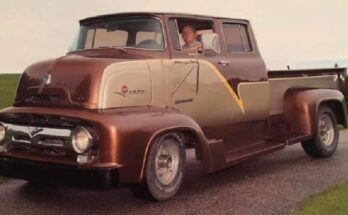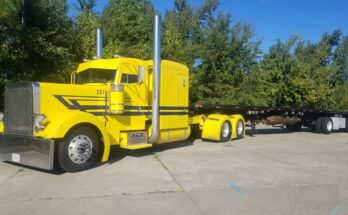Music to the ears of Truckers
When it comes to music about truck drivers, there is nothing like the “Road Hammers.” It’s said all their songs always about truck drivers.
So much so that “AllMusic Review” critic Rick Anderson wrote:
“When you cultivate a sort of Motörhead-meets-Charlie Daniels visual image but all of your songs have to do with the joys and sorrows of driving a truck, then you’re shooting for a pretty narrow demographic ‘
But he adds… so what?
There’s an eager audience for it but also for other groups as well who sing about the often lonesome roads traveled by truckers.
Their songs often speak of being away from homes and families. Coffee and cops are common themes. Tragedy as well.
Some of the earliest songs date back to the 1950s.
You can find all kinds of top 50 lists but the ten named here are probably the best known for the widest audiences that include not only drivers but anyone else who romanticizes the road.
No. 1: “Keep on Truckin” has entered the general American vocabulary to mean many things since former Temptations and Motown singer Eddie Kendricks released it in 1973. It reached several No. 1 lists and was almost as popular in the UK charts.
Kendricks did not leave out his old Temptations singing group:
In old Temptations’ rain, I’m duckin’
For your love through sleet or snow, I’m truckin’
Kendricks died of lung cancer in 1992 at the age of 52.
A park in his native Birmingham was named after him and Rapper Kendrick Lamar was said to have been named after him.
No. 2: Another No. 1 hit was ”Me and Bobby McGee.” Written by Kris Kristofferson and Fred Foster, it’s the melancholy story of two drifters. They hitch a ride from a truck driver. When they part ways, the singer is best described as having the blues.
Freedom’s just another word for nothin’ left to lose
Nothin’, that’s all that Bobby left me, yeah
But, feelin’ good was easy, Lord, when he sang the blues
Hey, feelin’ good was good enough for me, mm-hmm
Good enough for me and my Bobby McGhee
The song was first sung by Roger Miller. It later went through many versions and became best-known for Janis Joplin. It was not only associated with her but was the only one of her top ten records during her short life.
No. 3: “Roll On (Eighteen Wheeler).”
Written by Dave Loggins and recorded by country music band Alabama, it was a No. 1 single. It was the group’s 12th straight single No. 1 single on Billboard Magazine’s list.
It’s the somewhat sad story of a truck driver working to support his wife and three children.
“Daddy” tells his children that while he is gone, all they need to do is remember the song he taught them:
Roll on highway, roll on along, roll on Daddy ’til you get back home, roll on family, roll on crew, roll on mama like I asked you to do
This one has a happy ending, however. The family thinks “daddy” may have had an accident and goes through a tense night until hearing from him that “the man upstairs” listened to the song and the driver was found safe and sound.
No. 4: “East Bound and Down.” This is from the highly popular movie “Smokey and the Bandit.” It spent several months on the Billboard charts at No. 2 and became a television series of the same name.
Jerry Reed sang:
East bound and down, loaded up and truckin’
We gonna do what they say can’t be done
We’ve got a long way to go and a short time to get there
I’m east bound, just watch ol’ Bandit run
No. 5: “White Line Fever.” A popular song with many versions though never a No. 1 hit. Merle Haggard did the best-known version.
White line fever, a sickness born
Down deep within my soul
White line fever, the years keep flyin’ by
Like the highline poles
It’s generally believed the song was inspired by auto creator John DeLorean who was entrapped in a scheme to sell drug money to finance his company.
The upshot was a film of the same name.
And In 1988, the song was used in an anti-heroin public information film in the United Kingdom.
No.6. “On the Road Again.” It was written and made famous by Willie Nelson and became one of his biggest hits.
Many others copied it, including Alvin and the Chipmunks in a 1981 version where Alvin sings about his reluctance to do a road trip while he misses his home.
On the road again
Just can’t wait to get on the road again
The life I love is making music with my friends
And I can’t wait to get on the road again
On the road again
No. 7: Rubber Ducky.” First sung by Muppet character Ernie on Sesame Street named after his favorite toy. It became a surprise hit in 1970 and was nominated for the “Best Children’s Grammy.”
Little Richard performed a rock n’ roll version of it as a guest of the TV program.
Rubber Duckie you’re the one
You make bath time lots of fun
Rubber Duckie I’m awfully fond of you
No.8: “Convoy.” Best described as a 1975 novelty song performed by C. W. McCall. It became a number-one song on both the country and pop charts in the U.S. It was No. 1 in Canada as well. First heard in the Sam Peckinpah film “Convoy.”
Cause we got a mighty convoy
Rockin’ through the night.
Yeah, we got a mighty convoy,
Ain’t she a beautiful sight?
Come on and join our convoy
Ain’t nothin’ gonna get in our way.
We gonna roll this truckin’ convoy
‘Cross the U-S-A.
Convoy! Convoy! Convoy! Convoy!
No. 9: “Six Days on the Road.” This hit song goes back to 1963 and is sometimes credited with launching the truck driver song craze in modern times. It is also hailed as the definitive celebration of American truck drivers.
Dave Dudley sang it:
Well it seems like a month since I kissed my baby goodbye
I could have a lot of woman but I’m not like some of the guys
I could find one to hold me me tight,
But I could not make believe it’s right
Six days on the road and I’m gonna make it home tonight
No. 10: “Forty Miles of Bad Road.” Another song phrase that was so popular it become commonplace in the English language. Where did it come from?
Best guess is a record producer who heard a Texan say:
“Your girl has a face like forty miles of bad road.”
Duane Eddy recorded it as an instrumental.
No lyrics needed.
The title says it all.
By David Wilkening
 " >
" >


